"At least we have each other." |
Emma |
Love, as the famous song goes, hurts and then, for good measure, it scars, wounds and marks, and in the case of writer-director Sophie Laloy's debut feature-length film, Je te mangerais / Highly Strung,* it's definitely true. Spread over the course of a year, the film chronicles the incredibly complex relationship between childhood friends Marie (an impressive Judith Davis, here making her film debut), a talented pianist, and Emma (a fittingly intriguing and wonderfully odd Isild Le Besco, of Camping savuage/ Wild Camp and Les filles ne savent pas nager / Girls Cant Swim fame), a medical student. The pair are reunited when Marie moves from her rural home into Emma's Lyon apartment, her new base while she attends the city's prestigious music conservatory.
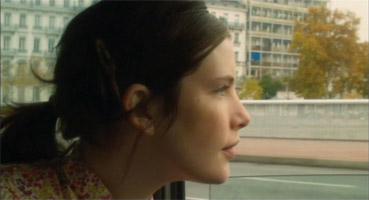
I knew the second I began to read the summary on the back of the DVD case – full of sizzling adjectives like "mystery," "secrets" and talk of "whirlwind" emotions, as freedom's found, independence gained and ardour fuelled, it became immediately clear that I was in for a bumpy ride, even before I'd even seen a frame. Worse still, I couldn't quite shake the feeling that these girls were doomed from the start. Experience had taught me as much. Tragedy is such a part of the cinematic depiction of lesbian romance that it's engrained, deep-rooted and often unchallenged. I'd argue it's so prevalent that it's almost expected and worryingly, accepted as a convention of the genre. Almost every film I've seen, right from William Wyler's Hollywood adaptation of Lillian Hellman's play The Children's Hour in 1961, to Mia Salsi's independent teen film Love and Suicide in 2006 obeys the rule. There are exceptions of course, such as Ol Parker's romantic comedy Imagine Me and You, but they're few and far between. Though that may be a sad reflection of the output, it's also a true one, with Richard Eyre's Notes on a Scandal, Jordan Scott's Cracks and most recently, Atom Egoyan's Chloe (a remake of Anne Fontaine's 2003 film, Nathalie) all serving to perpetuate that trend rather than buck it.
My opinions and my expectations have certainly been affected by that landscape and possibly damaged by it. To my mind, it just a matter of Emma and Marie how they met that impending doom, or to couch things in more romantic terms, how deeply they fell in love and how fast. The answer? At breakneck speed, and as for the former, I'm still unsure, since there is a fine line – sometimes wire thin – between love and obsession. At times, it's hard to tell which side of the line this film is straddling. Quite quickly, it became clear that my early judgements, though snappy, were correct. Highly Strung is not a love story of the hearts and flowers, Hallmark card or Richard Curtis variety, but has more in common with Adrian Lyne's Fatal Attraction, Barbet Schroeder's Single White Female and Denis Dercourt's La tourneuse de pages / The Page Turner. To use a few more genre appropriate comparisons, there are definite echoes of Catherine Corsini's La Répétition / Replay and Jean-Claude Brisseau's Choses secretes / Secret Things, and the tragic adolescent love story of Léa Pool's Lost and Delirious (a fellow Peccadillo Pictures label mate).
Though it's based on Laloy's own experiences with a flatmate while she herself attended the same school, which brings a rather nice edge to events as you watch them unfold – the truth, is, after all, stranger than fiction – the shadow of Pool's film looms large, not least because it's openings are so similar. In the case of Delirious, the new arrival is the shy, introverted Mary 'Mouse' Bradford (Mischa Barton) heading toward a girls boarding school, unwitting observer to the closeted romance between her two new roommates Paulie (Piper Perabo) and Tori (Jessica Paré). The fact that Highly Strung's Davis bears a striking resemblance to Paré didn't help matters either.
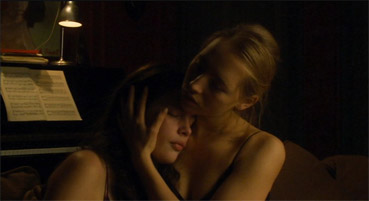
Right from opening moments there's an air of foreboding, a sinister undercurrent that nudges ever so subtly at your subconscious and perhaps your conscience. The innocent sounding piano you hear as sweet, excitable and somewhat naïve Marie (an immensely powerful Judith Davis, making her film debut) travels with her family from their rural home to Lyon, where she's set to take up a place at the city's prestigious music conservatory, is just that little bit unsettling, and makes you wonder what will happen next. That melody recurs throughout the film, almost like a tolling bell, and all too soon, Marie shares that dread.
Yes, this is a classic case of amour fou/mad love in every sense of the phrase. Highly Strung is a slow-burn, sinister, yet strangely alluring tale. Things start innocently enough, with Marie very much in the thrall of her worldly-wise, sophisticated friend, not quite believing how much she's changed since their younger years. Naïve, sweet and somewhat sheltered thanks to her own upbringing, Marie trails in Emma's wake, as she introduces her to Lyon's nightlife going to clubs and restaurants. The editing in he latter scene in particular plays up the angle of Marie's early infatuation and curiosity with Emma rather beautifully, and for a while at least, things are rather idyllic, as the two go back and forth in a strange, sexualised play on cat-and-mouse.
Their games take on a rather more dangerous slant when Marie begins to make friends and branch out, eventually falling for her classmate Sami (Johan Libéreau), who in becoming Marie's on-off boyfriend, inadvertently becomes the thorn in Emma's side. Soon after Marie and Sami's relationship begins, Emma's true colours begin to show. She's the more emotionally guarded of the two, obviously scarred by the absence of her artist mother, and possibly envious of Marie's comparatively perfect home life, with a loving set of parents and three sisters. In Emma's eyes, the handsome, genial Sami is a threat to the perfect little world she and Marie have created in their apartment, and she quickly attempts to restore order by clipping Marie's fledgling wings, laying down rules that they aren't allowed to have overnight guests. As soon as she finishes her sentence, you can almost feel the walls begin to close in on an unwitting Marie, and at times, you wonder why she stays with Emma at all.
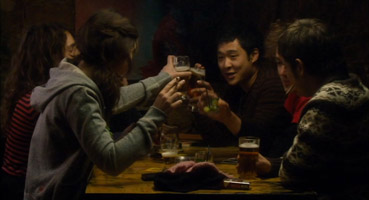
As their grip on each other tightens, other aspects of Marie's life suffer, with her tutors at the conservatory growing concerned when she frequently arrives late for lessons, and ruins a recital which would give her the chance to play on the local radio station. That prize ultimately goes to Sami, and when the station plays the recording over Christmas, as he and Marie sit round the dinner table with her family, Marie's regret is palpable.
In the rare moments when she does attempt to break incredibly vicious circle she and Emma are constantly navigating, they're fleeting, and she's often burned in the process. When she brings Sami to the apartment after an argument with his grandmother leaves him homeless, Marie either uses him as a buffer for Emma's advances or as a sex toy, flaunting their relationship in Emma's face, allowing herself to be seen naked and objectified by the both of them. Soon afterward, Sami confronts Marie, and questions the nature of her relationship with Emma, tired how he's being treated; he breaks up with her and packs up his things, leaving the two girls alone once more.
What's so intriguing and ultimately infuriating about Highly Strung is the ambiguous nature of Marie and Emma's relationship. It's to Laloy's credit that she never sets things in stone, since we don't live life in black and white. Our behaviour, life choices and the way we express our emotions are never truly clear cut. However, sometimes what we see on screen seems less about love or romantic love and more about lust and possession, as Emma continues to pursue Marie as if she were some sort of inanimate prize that she can set on the mantelpiece, alongside the remnants of canvasses left behind by her estranged artist mother. Marie too, is not entirely innocent, since she willingly goes along with Emma's plans, and doesn't openly refuse her until much later in the film, and even then, that rebuttal feels more indicative of her confused feelings regarding her sexuality and her growing appetite for sexual experiences rather than a clear statement to be left alone.
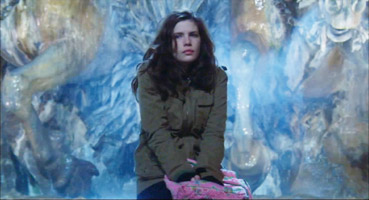
That ambiguousness extends to the characterisation of Emma and Marie. It's never really clear who is in control or indeed, who is the victim, since the roles are very much interchangeable, which makes it incredibly hard to side with one or the other, and various points you'll find yourself rather torn, one moment you'll empathise with Emma, and the obvious pain her seemingly unrequited love brings and the next, you'll be caught up in be afraid for Marie, watching as she wades in deeper and deeper, pulled in by Emma's magnetism, with ever narrowing escape routes.
Love, both real and cinematic is often felt in extremes, and this is a film which follows the ebb and flow of those polarised states. The story that unfolds is as nuanced as the delicate, intricate piano pieces Marie attempts to master over the course of the year. The soundtrack of Schumann, Bach and Ravel combine to articulate dialogue of another kind; expressing things the characters fear, cannot do or cannot say. By the time the film ends, and Marie gives her final recital, these compositions feel like extra characters in their own right, and the oft-practiced opening notes of Schumann's 'Carnival' will be stuck fast in your head, leaving you pondering the consequences of the strange and seductive mystery tour Sophie Laloy has just lead you on.
The phrase consuming passion has never felt more appropriate.
A strong 1.85:1 anamorphic transfer an excellent contrast range, respectable sharpness and colour that alternates between toned down and vivid – the neon lights in a brief early night-time sequence by a fountain really pop. The image holds its integrity in darker scenes but loses some of its punch and feels a little softer on detail, which returns with aplomb on the daylight exteriors. There is some earthy post-production colour tinting – a meal scene 58 minutes in is a good example – which is quite visvid at times but doesn't feel excessive.
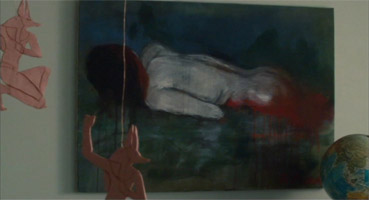
The 5.1 surround soundtrack is very clear with a strong range, though does sit largely front and centre – there's not much happening at the back save for some low level city exterior location sound.
Highly Strung: Making-of (26:34)
A welcome surprise and a compliment to the film itself, this can be played with or without English subtitles. If you want to remain unspoiled in regards to the plot, I'd watch this after viewing the film, since it does give elements away. The first few minutes are rather are rather jaunty, with a fast-cut sequence of various on-set and on-location moments, set to accordion music – lending things a rather wonderful Gallic almost whimsical charm (these little sequences appear intermittently to signal changes in the discussion). However, from then on, things are a little more conventional, incorporating behind-the-scenes material, film excerpts and interviews with writer-director Sophie Laloy, and lead actors Isild Le Besco and Judith Davis. The feature is divided into segments concerning different aspects of the production including the genesis of the project and the production process, the look of the film and the use of music. More focussed discussion of the film's narrative structure and the characterisation of Emma and Marie occurs throughout, which makes it feels less chaotic and rather more cohesive than it might have been. Though the interviews themselves are informal, there's a surprising amount of detail explored in comparison to standard EPK fare, which really adds to the experience. Well worth a look.
Trailer (1:35)
A nicely paced and constructed piece that manages to get across the main themes of the film without giving too much away either, which is always a danger with films of this type. There's an added bit of cultural cachet comes at the end via the inclusion of its various achievements on the festival circuit.
Also included are trailers for other Peccadillo films, including the forthcoming theatrical releases of Haim Tabakman's Einaym Pkuhot / Eyes Wide Open and Pascal-Alex Vincent's Donne-moi la main / Give Me your Hand alongside a selection titles already available on DVD. Further information on the latter can be found in the accompanying Peccadillo Pictures 2010 Catalogue.
Highly Strung is an atmospheric and brooding debut feature from Sophie Laloy, that shows great promise, and is most certainly made by her attention to detail and underplayed script, which work in contrast to violently intense nature of Emma and Marie's relationship. In terms of their performances, Besco and Davis can't be faulted; both are strong and display impressive range, especially Davis. Though the film certainly looks and sounds beautiful, what could have been an interesting study of the nature of attraction and the consequences of extreme passionate love, misses the mark because it falls into the classic trap of portraying a lesbian relationship as an obsessive one, reinforcing an already rather tired negative stereotype. These characters grow, but they don't change and that makes it hard to empathise with them or understand their actions. If you can stand to endure another tragic tale on the grounds of artistic merit, then Highly Strung might be one for your collection.
|